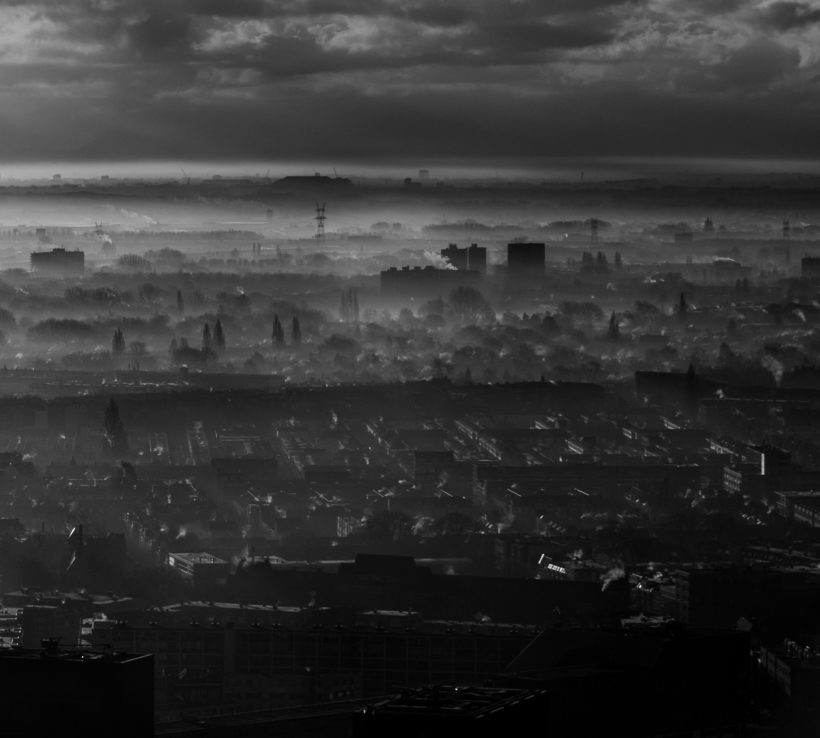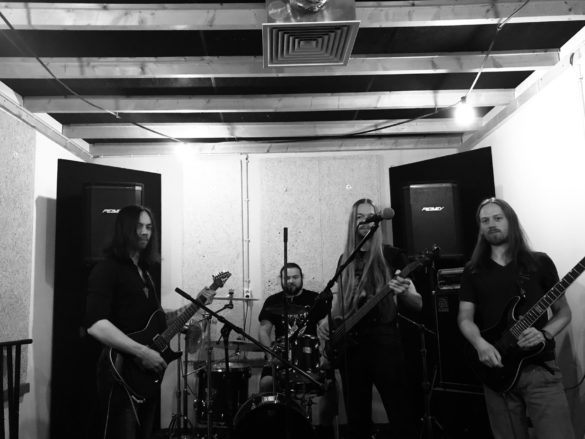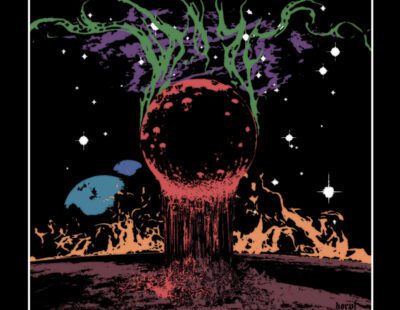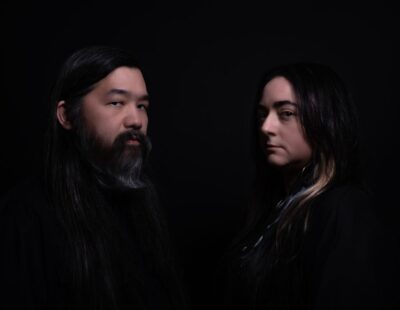
Dutch black metal project Wesenwille was crafted from a collaboration between vocalist/guitarist R. Schmidt and drummer D. Schermann. Etched from confrontational dissonance, their I : Wesenwille debut turns its lyrical lens towards modern technology’s societal side-effects. When “The Churning Masses” clangs out of the smoke and fog of the album’s cover photo, a sound clip from the film adaptation of George Orwell’s 1984 reveals one of Wesenwille’s harrowing main themes: “If you are a man, Winston, you are the last man. Your kind is extinct; we are the inheritors. Do you understand that you are alone? You are outside history, you are non-existent.”
It can be hard to crawl out of Schmidt’s riffs alive and wrap your mind around humanity’s slow self-destruction and erasure. Dense and fanged like coiled barbed-wire, Wesenwille’s compositions prod at uncomfortable silences and unfold with unpredictable elegance. Each song feels dense as a dying star, invoking atmospheric contemporaries like Deathspell Omega and their countrymen Dodecahedron while surging with more metallic urgency. From the fiery charge of “Prosopopoeia” to the solar eruption of “Golden Rays of the Sun,” I : Wesenwille feels like it’s racing the listener toward a cliff’s edge overlooking a decrepit metropolis.
Below, read as Schmidt explains the band’s name, applies philosopher Ferdinand Tönnies’ social theories to black metal communities, and reveals which of Wesenwille’s songs is going to rip hardest live. But first, give I : Wesenwille a fully-engaged listen before it’s released from Redefining Darkness Records on April 27th. It’s like Orwell wrote: “Power is in tearing human minds to pieces and putting them together again in new shapes of your own choosing.” Hand that power over to Wesenwille and press play below.
Both members of the band have been in numerous other projects. What were the common goals, aesthetics, or beliefs that brought the members of Wesenwille together to form this new band?
R. Schmidt: We had known one another for a while before starting Wesenwille. The three of us (that’s including M., who is no longer with Wesenwille) were and are still active in a death metal band called Iron Harvest. D. and M. go back even further, as they have been running their main act Weltschmerz for more than ten years by now. One evening in 2013 the three of us spent a night drinking together, which is obviously where most good ideas start. At the time we were listening to bands like Svartidauði, Shining (Sweden), Svart Crown, Triptykon, etcetera. We figured that their styles contained elements that we should to incorporate in a project sometime. Thus, we decided to start Wesenwille, where some of the central ideas revolve around the use of dissonance and varied time signatures, and importantly plenty of room for passages to gradually develop while each instrument has a clear role of its own.
There are quotes from George Orwell’s 1984 that link the songs throughout. What about this novel connects to the lyrical themes of the record?
RS: Many of the ideas in George Orwell’s 1984 are really a great fit with the lyrical content on I: Wesenwille. The album deals with the effects of industrialization and the tendency of humans to move from living in small communities to large societies on human social interactions. What we see in 1984 is an extreme interpretation of the effects these processes could have on human life. Considering that the dark atmosphere of this story fits well with that of our music, they turned out to be a great marriage.
I love the album’s cover photography, which shows a city under the cover of smoke and fog, almost like a layered cross-section of a wasteland. What more can you tell us about the cover image and its intent?
RS: Other than simply being a stunning image and perfect album cover material, this photograph also perfectly conveys the atmosphere of the music on I: Wesenwille. It has this really ominous vibe to it, while containing elements of both industry and nature, which of course works very well considering the album’s concept. The photograph was taken by P. Schmidt in Rotterdam, the Netherlands. If you’re into photography involving architecture then there’s a lot more where this came from.
The band’s name is derived from Ferdinand Tönnies thoughts on human will. I know he also had theories about different types of social interaction, so is your band closer to an example of Gemeinschaft (a community based on mutual bonds) or Gesellschaft (a connection focused on individual goals)?
RS: Focusing on the band or, on a larger scale, the black metal scene in Utrecht, I’d say we are a good example of a ‘community’ striving towards common goals, with a strong focus on building mutual bonds. On the other hand we are all individuals trying to function in the context of a large society, with our own individual goals to fulfill. So I’d have to say neither really excludes the other in our case.
You’re playing your first show at the Dark Mental Festival in Copenhagen on April 27th. Which of the songs are you most excited to play live, and why?
RS: Luckily we’ll be able to perform I: Wesenwille in its entirety in Copenhagen, as we’ll have just enough time to do so! Even though we’re very content with how every track on the album came to fruition, there’ll always have to be favorites. We think “Golden Rays of the Sun” will be great to play live, as it is starts off really aggressively and it contains most of the elements we incorporated into the album as a whole.
What else is planned for Wesenwille in 2018 and beyond?
RS: In June and later this year we will be focusing on playing some great shows to promote the album. Live we will be supported by Léon (ex-Melechesh (live)) and Matthias (Iron Harvest, Wrang (live)) on guitar and bass, respectively. While most dates are still to be confirmed, we’re happy to share that we’ll be performing alongside Terzij de Horde, Laster and Grafjammer in our hometown to showcase how nutritional Utrecht’s soil is for growing diverse black metal acts. In addition to that both of us are involved in quite a few other projects next to Wesenwille: D. has been getting some great opportunities as a live member of Glorior Belli and Nocturnal Depression recently (next to his main acts Grafjammer, Weltschmerz and Wrang, among others). R. is mainly working on Verval, which recently released its debut album. Other than that, we’ll be excited to see how the Wesenwille album is received internationally, and we’re definitely thinking of starting work on a second release quite soon. So, stay tuned for more!
Reclaim your humanity and pre-order I : Wesenwille from Redefining Darkness Records HERE
And don’t forget to follow Wesenwille on Facebook for tour information HERE







